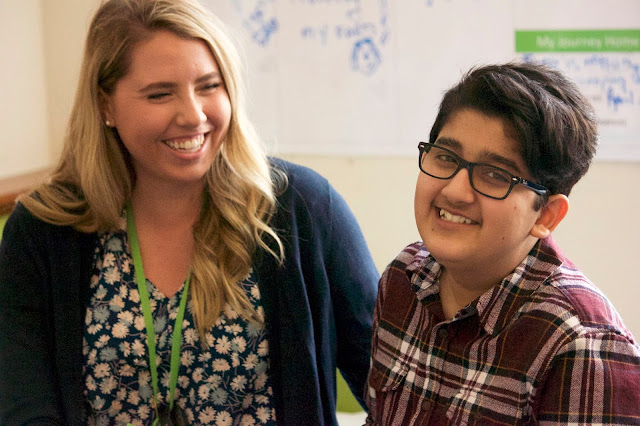Rehan Siddiqui tells the chilling story of how his son and daughter were hit by a car that went through a red light. “She hit both kids going 60 km an hour,” he says. “How could the driver not realize the light was red? There was nothing wrong with the signal.”
Rehan, who sleeps inches away from his son Omar’s hospital bed at Holland Bloorview, says that Omar suffered a severe brain injury and was on life support for 19 days. He spent two months in acute-care, and has been here since January.
Omar, 14, has a slightly different perspective. “It’s a great story to tell my kids,” he says with a smile. “It was like one day I fell asleep, and the next day, I woke up in a wheelchair in this hospital.” The other thing he woke up with, he says, was a new personality.
“Before, I used to be really shy and quiet. I would never crack jokes. I was never brave enough to raise my hand up to answer a question in school. When we did presentations, I wanted to go last.”
Now, “my family says I can never stop talking. I’m always cracking jokes, and I like acting. 'Reporting live,' he says, holding a mock microphone, 'right now, I’m doing an interview with this young lady.'”
When Omar is discharged in two weeks, he says his first order of business is to put together a video for his YouTube channel. “I want to tell the story of my accident and recovery. Bloorview said it might put it on their website for other kids to see.”
Child-life specialist Amarens Matthiesen says Omar has been a great support to other children on the unit.
For example, when Omar encouraged one boy, the patient smiled for the first time. “I said ‘Oh hey, I was just like you. I was sound asleep for a month, and I needed to be in a wheelchair. But look at me now. I can jump. I can run.’ I gave him a lot of motivation.”
Omar used to want to be an architect. “I love to build stuff, and me and my father do handiwork around the house. But I changed my mind since my accident. Now I want to become a YouTuber when I’m older.”
Omar says his best advice for rehab staff is to have fun with patients. “I think most are very good at having a sense of humour, and joking around. Some are really serious, which makes me feel a little uncomfortable.”
Omar says the hardest part of rehab was when his favourite child and youth worker injured herself, and was off work. “She was a beautiful, caring woman who I loved. She would push my wheelchair everywhere, and she would do anything to make me laugh. We had really funny jokes. We were heart to heart.”
Omar is excited about returning to school. “He’s a miracle child,” his father says.


























3 comments:
Hi Omar,
would love to see your YouTube channel.
Bravo Omar, you made it possible and you have set an example for others who are struggling.
I'm more outgoing since my TBI. I speak my mind. I'm not sure if that's a good thing at times though. But, I do know when not to say certain things.
Post a Comment